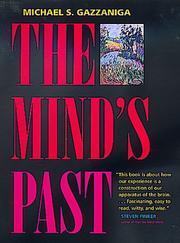| Listing 1 - 2 of 2 |
Sort by
|

ISBN: 1282355104 9786612355103 0520925483 9780520925489 0585031738 9780585031736 0520213203 9780520213203 0520224868 9780520224865 Year: 1998 Publisher: Berkeley, CA : University of California Press,
Abstract | Keywords | Export | Availability | Bookmark
 Loading...
Loading...Choose an application
- Reference Manager
- EndNote
- RefWorks (Direct export to RefWorks)
Why does the human brain insist on interpreting the world and constructing a narrative? In this ground-breaking work, Michael S. Gazzaniga, one of the world's foremost cognitive neuroscientists, shows how our mind and brain accomplish the amazing feat of constructing our past-a process clearly fraught with errors of perception, memory, and judgment. By showing that the specific systems built into our brain do their work automatically and largely outside of our conscious awareness, Gazzaniga calls into question our everyday notions of self and reality. The implications of his ideas reach deeply into the nature of perception and memory, the profundity of human instinct, and the ways we construct who we are and how we fit into the world around us.Over the past thirty years, the mind sciences have developed a picture not only of how our brains are built but also of what they were built to do. The emerging picture is wonderfully clear and pointed, underlining William James's notion that humans have far more instincts than other animals. Every baby is born with circuits that compute information enabling it to function in the physical world. Even what helps us to establish our understanding of social relations may have grown out of perceptual laws delivered to an infant's brain. Indeed, the ability to transmit culture-an act that is only part of the human repertoire-may stem from our many automatic and unique perceptual-motor processes that give rise to mental capacities such as belief and culture.Gazzaniga explains how the mind interprets data the brain has already processed, making "us" the last to know. He shows how what "we" see is frequently an illusion and not at all what our brain is perceiving. False memories become a part of our experience; autobiography is fiction. In exploring how the brain enables the mind, Gazzaniga points us toward one of the greatest mysteries of human evolution: how we become who we are.
Neuropsychology. --- Brain --- Neurophysiology --- Psychophysiology --- Evolution. --- Developmental neurobiology. --- Memory. --- academic. --- adaptation. --- autobiographical. --- belief. --- brain activity. --- brain development. --- brain. --- conscious. --- consciousness. --- construction. --- cultural studies. --- decision making. --- experiments. --- faith. --- false memories. --- human brain. --- human evolution. --- human experience. --- human mind. --- human nature. --- judgment. --- know yourself. --- lab work. --- memory. --- mental development. --- neurology. --- neuroscience. --- neuroscientist. --- perception. --- scholarly. --- self esteem. --- self knowledge. --- social studies.
Book
ISBN: 0520374339 9780520374331 9780520344174 0520344170 Year: 2020 Publisher: Oakland
Abstract | Keywords | Export | Availability | Bookmark
 Loading...
Loading...Choose an application
- Reference Manager
- EndNote
- RefWorks (Direct export to RefWorks)
More than seventy years ago, American forces exploded the first atomic bombs over the Japanese cities of Hiroshima and Nagasaki, causing great physical and human destruction. The young scientists at Los Alamos who developed the bombs, which were nicknamed Little Boy and Fat Man, were introduced to the basic principles and goals of the project in March 1943, at a crash course in new weapons technology. The lecturer was physicist Robert Serber, J. Robert Oppenheimer’s protégé, and the scientists learned that their job was to design and build the world’s first atomic bombs. Notes on Serber’s lectures were gathered into a mimeographed document titled TheLos Alamos Primer, which was supplied to all incoming scientific staff. The Primer remained classified for decades after the war. Published for the first time in 1992, the Primer offers contemporary readers a better understanding of the origins of nuclear weapons. Serber’s preface vividly conveys the mingled excitement, uncertainty, and intensity felt by the Manhattan Project scientists. This edition includes an updated introduction by Pulitzer Prize–winning historian Richard Rhodes. A seminal publication on a turning point in human history, The Los Alamos Primer reveals just how much was known and how terrifyingly much was unknown midway through the Manhattan Project. No other seminar anywhere has had greater historical consequences.
Atomic bomb --- Physicists --- History. --- Manhattan Project (U.S.) --- Los Alamos Scientific Laboratory --- 1940s. --- american history. --- atom bomb. --- atomic bombs. --- controversial. --- fat man. --- hiroshima. --- japan. --- japanese history. --- lab work. --- little boy. --- los alamos primer. --- los alamos. --- manhattan project. --- nagasaki. --- nuclear bomb. --- nuclear weapons. --- scientific discovery. --- scientific history. --- scientists. --- untold story. --- wartime. --- weapons of mass destruction. --- weapons. --- world history. --- world war 2. --- wwii.
| Listing 1 - 2 of 2 |
Sort by
|

 Search
Search Feedback
Feedback About UniCat
About UniCat  Help
Help News
News